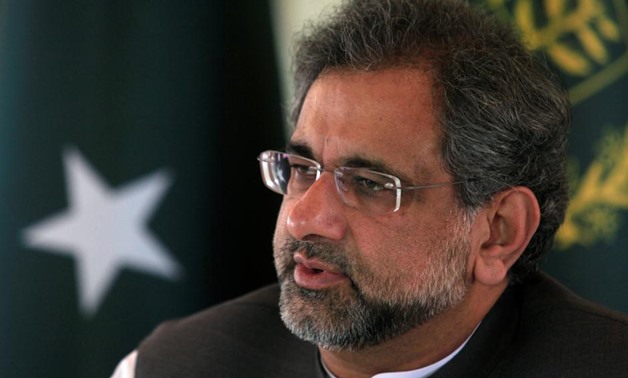
Pakistan's Prime Minister Shahid Khaqan Abbasi - REUTERS
ISLAMABAD - 26 October 2017: Prime Minister Shahid Khaqan Abbasi on Tuesday reconfirmed Pakistan's commitment to the "war on terror" during a meeting with U.S. Secretary of State Rex Tillerson, saying his country had "produced results" fighting the region's Islamist militants.
Relations between uneasy allies United States and Pakistan have frayed in recent years, with Washington accusing Islamabad of turning a blind eye or helping Afghan Taliban and Haqqani network militants who stage attacks in Afghanistan. Pakistan denies doing so.
President Donald Trump has vowed to get tough with Pakistan unless it changed its behaviour, with U.S. officials threatening further reductions in aid and mooting targeted sanctions against Pakistani officials.
Tillerson, on a tour of Asia and the Middle East, arrived in Pakistan on Tuesday afternoon and met with Abbasi, as well as Pakistan's powerful army chief, General Qamar Javed Bajwa.
"We are committed in the war against terror," Abbasi told Tillerson, as the two men sat facing each other on a long table.
"We have produced results. And we are looking forward to moving ahead with the U.S. and building a tremendous relationship," added Abbasi, who sat next to Bajwa.
During a short part of the meeting available to media, Tillerson told the Pakistani delegation that the nuclear-armed nation was an important U.S. ally in the region.
"(Pakistan is) important regionally to our joint goals of providing peace and security to the region and providing opportunity for greater economic relationship as well," Tillerson said.
U.S officials say they are frustrated that Afghan Taliban and Haqqani militants are afforded freedom of movement and are able to transport weapons and raise funds inside Pakistan, something their Islamabad counterparts staunchly deny.
On Monday, during a visit to Kabul, Tillerson urged Pakistan to act against safe havens on its soil.
"Pakistan needs to, I think, take a clear-eyed view of the situation that they are confronted with in terms of the number of terrorist organisations that find safe haven inside of Pakistan."
"RED LINE"
Pakistani officials bristle at the idea that the country is not doing enough against militants and say Pakistan has suffered more than 60,000 casualties in the war on terror since the Sept. 11 attacks in United States in 2001.
In recent years Pakistan has made substantial gains against militants and the number of attacks have drastically reduced, but some militant groups such as the Pakistani Taliban and the Islamic State continue to pose a threat and have periodically staged large-scale attacks.
Pakistan recently started to fence its long and porous 2,500-km border with Afghanistan in an attempt to stop militants criss-crossing the frontier.
As well as support for the Afghan Taliban and the Haqqani network, another sticking point in the relationship has been growing closeness by the United States to India, Pakistan's arch-foe and neighbour.
Tillerson said last week that the Trump administration wanted to "dramatically deepen" cooperation with New Delhi, partly to offset Chinese influence in Asia. Trump has also called for greater Indian role in Afghanistan.
But this deepening in ties has alarmed Pakistan, which has rejected a greater political role for India for Afghanistan as a "red line" for Islamabad.
Tillerson is due to arrive in India late on Tuesday.

Comments
Leave a Comment